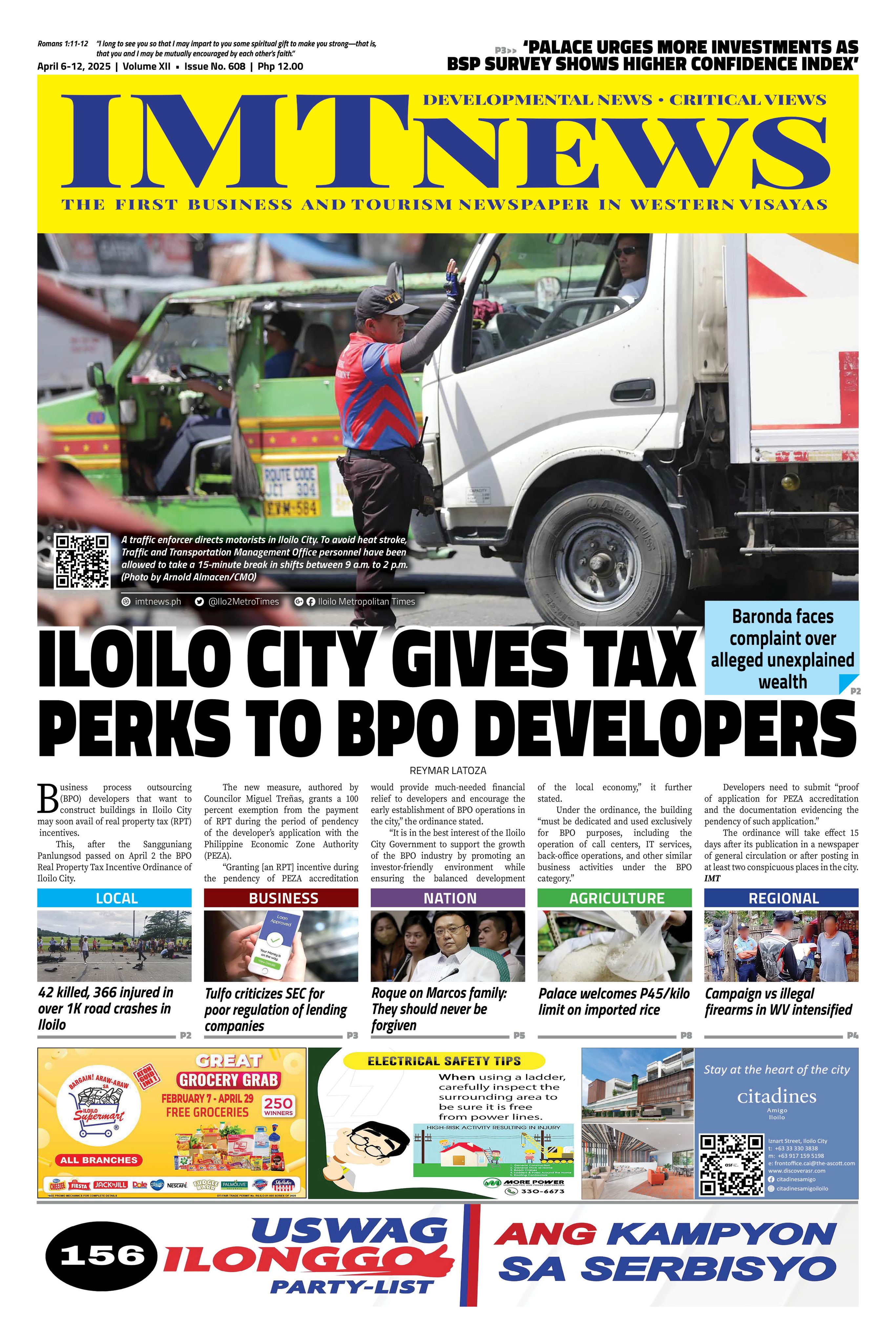“With but few exceptions, it is always the underdog who wins through sheer willpower.”—Johnny Weissmuller
EVEN if all the 22 Filipino athletes participating in the ongoing 2024 Paris Olympic Games or 2024 Paris Olympics will end up as gold medalists, we can never surpass China, our tormentor in the Ayungin Shoal cat-and-mouse setto, which sent 388 world-class athletes in the quadrennial event.
At this early, we project China to grab at least 40 gold medals when the Olympic Games conclude on August 11, 2024.
On the other hand, it’s still a big question mark if we can even duplicate the one-gold, two-silver and one-bronze medal haul in the 2020 Tokyo Olympics, where we won our first gold courtesy of weightlifter Hidilyn Diaz.
Anywhere we look, we are distressingly inferior vis-à-vis China and there’s nothing we can do about it except to keep on fighting and dreaming however impossible to beat the overwhelming odds.
In fact, while all eyes were focused on gymnast Carlo Yulo (he’s our only hope for the medal other than the male boxers), China issued a stern warning it would “respond resolutely” to any violation by the Philippines of a recent deal to calm tensions between the two countries in the South China Sea, according to report July 27 that quoted China’s top diplomat in Beijing.
The Philippines has been locked in a longstanding territorial row with China over parts of the strategic waterway through which trillions of dollars worth of trade passes annually.
-o0o-
Even if China will ignore the countries that have condemned its continued arm-twisting tactics against the inferior boats of the Philippines in the disputed sea and go on with its unlawful entry in our sovereign waters while the Olympic Games is in progress, it can still conquer the world’s biggest sporting competition and bring home more medals.
That’s how powerful and dominant China is. In population, sports, economy, war and space technology, they are notches higher; we will forever be a David for this Goliath.
Like in the 2020 Tokyo Olympics where China collected 88 medals 38 golds; 32 silvers; 18 bronzes) and wound up second to the United States (113 medals—39 golds; 41 silvers; 33 bronzes), the country that has been harassing Filipino fishermen and supply boats is expected to shoot for the overall crown in Paris against the United States and Great Britain (fourth placer in Tokyo Games (65 medals—22 golds; 21 silvers; 22 bronzes).
-o0o-
(The following statement was jointly released by the Governments of the United States of America and the Philippines on the occasion of the successful conclusion of the Philippines-United States Cyber-Digital Policy Dialogue in Washington, D.C.) First of two parts:
Senior U.S. and Philippine officials gathered in Washington for the United States – Philippines Cyber-Digital Policy Dialogue on July 15 and 16, 2024. The United States and the Philippines reaffirmed their shared commitment to promote an open, interoperable, secure, and reliable, Internet, an information and communication technologies (ICT) ecosystem that supports the growth of the digital economy and stability in cyberspace, as well as to deepen bilateral cooperation on cybersecurity.
U.S. Ambassador at Large for Cyberspace and Digital Policy Nathaniel Fick and Philippines Department of Information and Communications Technology (DICT) Secretary Ivan John E. Uy opened the dialogue by underscoring the essential role of international cyber security and digital policy in reinforcing a shared commitment to democratic values and digital solidarity. The Cyber Policy discussions were chaired by Department of State Deputy Assistant Secretary for International Cyberspace Security Liesyl Franz and Philippines DICT Undersecretary for Infostructure Management, Cybersecurity and Upskilling, Jeffrey Ian C. Dy. The Digital Policy discussions were chaired by U.S. Coordinator for International Communications and Information Policy Ambassador Steve Lang and Philippines DICT Undersecretary Jeffrey Dy. The U.S. delegation included representatives from the Department of State; the Office of the National Cyber Directorate; U.S. Agency for International Development (USAID); Department of Defense; Department of Homeland Security; Department of Commerce’s National Telecommunications and Information Administration, International Trade Administration, and National Institute of Standards and Technology; Department of Justice, including the Criminal Division and Federal Bureau of Investigation (FBI); Federal Communications Commission; Federal Trade Commission; U.S. Trade and Development Agency; U.S. Export-Import Bank; and the U.S. International Development Finance Corporation.
The Philippines was represented by delegates from the DICT, Cybercrime Investigation Coordinating Center (CICC), National Security Council (NSC), Department of Foreign Affairs (DFA), Department of Transportation (DOTR) – Office of Transportation Security, Philippine National Police (PNP), Department of Trade and Industry, (DTI), National Telecommunications Commission (NTC), National Privacy Commission (NPC), National Intelligence Coordinating Agency (NICA), Department of National Defense (DND), Armed Forces of the Philippines (AFP).
Both sides provided updates on their respective national cyber policies and exchanged views on bilateral cyber cooperation and developments in regional and international fora. Participants explored new ways for the United States and the Philippines to promote cyberspace stability, including through further discussions on the role of accountability in cyberspace and deterring malicious cyber activity. Participants discussed strengthening regional cooperation on cyber capacity building and efforts to combat cybercrime, including in the context of the Philippines’ recent admission to the International Counter Ransomware Initiative. In particular, the United States and the Philippines reaffirmed their commitment to enhance bilateral cooperation and strengthen cyber resilience. Both sides committed to further discussions on the protection of critical infrastructure against malicious cyber activity and enhanced collaboration between respective national Computer Emergency Readiness Team (CERTs).
(The author, who is now based in New York City, used to be the editor of two daily newspapers in Iloilo.—Ed)








